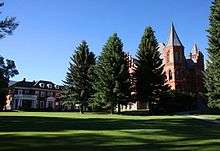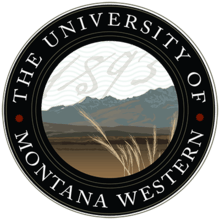University of Montana Western
 | |
Former names | Montana State Normal College, Montana State Teachers College, Western Montana College |
|---|---|
| Type | Public |
| Established | 1893 |
| Chancellor | Beth Weatherby |
| Provost | Interim Sylvia Moore |
| Vice-Chancellor | Susan Briggs |
| Students | 1379 |
| Location |
Dillon, Montana, United States 45°12′30″N 112°38′18″W / 45.20833°N 112.63833°WCoordinates: 45°12′30″N 112°38′18″W / 45.20833°N 112.63833°W[1] |
| Colors |
Red, White, Black |
| Athletics |
Frontier Conference NAIA |
| Nickname | Bulldogs |
| Affiliations | The University of Montana |
| Website | www.umwestern.edu |
 | |
The University of Montana Western is a public university located in Dillon, Montana, United States. It is affiliated with The University of Montana and is part of the Montana University System. The school was founded in 1893 as Montana State Normal School. The basis upon the founding of this college was as a center for training teachers. It was formerly known as Western Montana College before becoming part of the Montana University System in 2000. Enrollment as of fall 2011 was 1,379 students.[2]
Experience One
The University of Montana Western is the only public college in the U.S. to offer Experience One, an innovative program in which students take one class at a time for about 18 days. This type of scheduling, called block scheduling, creates a unique learning experience that allows for students to learn in-depth one subject at a time. The block also gives flexibility for students to learn outside of the classroom setting on one day or multiple week trips.
UMW’s Environmental Sciences department offers many courses that take overnight trips throughout Montana, to Utah, and Canada. Multiple courses have been offered through the university’s Honor’s Program where students get to study abroad for up to 3 weeks. Experience One, combined with small classrooms and affordable tuition, has given Western’s students an opportunity to excel and placed University Montana Western among the best in the nation in recent U.S. News & World Reports.
History
It was founded as the Montana State Normal School in 1893, to train teachers according to a model used by other states. Education was considered highly important for the state. It was expanded with increased programs and had a four-year curriculum; the addition of other subjects and departments led to its being renamed as Western Montana College. It became part of the Montana University System in 2000, and is titled University of Montana Western.
The first term of the Montana State Normal School began on September 6, 1897 with courses in elementary education for all grades below high school which took two years to complete, a one year professional course for all teachers with two years of prior experience, an English-Scientific course which gave students a four year diploma, a four year Latin course, and a graduate course. The first course catalogue had this statement along with an explanation of the necessity of teachers:
"On September 6th the Montana State Normal School will be organized for its first year's work. A well-equipped building has been provided; a faculty of thoroughly qualified teachers has been employed and courses of study adapted to the needs of those preparing to teach have been arranged. The citizens of Dillon have made every effort to secure good accommodations for the students. The State Normal will open under the most favorable conditions for a high grade of work. The most satisfactory results may be promised all who enter upon any of its courses of study."
Certificate programs
Early Childhood Certificate
Farrier Science Certificate
Small Animal Grooming Certificate
Associate Degrees
Associate of Arts
Associate of Science
Associate of Applied Science: Business
Associate of Applied Science: Early Childhood Education
Associate of Applied Science: Education Studies
Associate of Applied Science: Equine Studies
Associate of Applied Science: Natural Horsemanship
Associate of Applied Science: Tourism & Recreation
Bachelor's degrees
Bachelor of Applied Science (BAS)
Bachelor of Arts (BA)
BA: English
BA: English & Secondary Education Double Major
BA: Anthropology & Sociology
BA: Global Politics
BA: Interdisciplinary Social Science
BA: Interdisciplinary Social Science & Secondary Education Double Major
BA: Modern History
BA: Modern History & Secondary Education Double Major
BA: Psychology
BA: Visual Arts Option
Additional BA Related Areas: Drama, Equine Studies, Music, Visual Arts
Bachelor of Science (BS)
BS: Biology
BS: Biology & & Secondary Education Double Major
BS: Business Administration
BS: Environmental Interpretation
BS: Environmental Science
BS: Health & Human Performance
BS: Mathematics
BS: Mathematics & Secondary Education Double Major
BS: Natural Horsemanship
Bachelor's degrees in Education
BS: Early Childhood Education
BS: Elementary/Secondary Education
BS: Elementary Education
Elementary Education Minor:
Early Childhood Education
Option: Coaching
Elementary Education Middle School Option Areas:
Instructional Technology, Mathematics, Earth Science
Life Science, Physical Science, Social Studies
BS—Secondary Education & K-12 Education
Secondary Education Majors:
BS: Art Education K-12
BS: Business & Computer Applications Education
BS: Music Education K-12
BS: Physical Education & Health K-12
Secondary Education Double Majors:
BA: English & Secondary Education Double Major
BA: Interdisciplinary Social Science & Secondary Education Double Major
BA: Modern History & Secondary Education Double Major
BS: Biology & Secondary Education Double Major
BS: Earth Science & Secondary Education Double Major
BS: General Science Broadfield & Secondary Education Double Major
BS: Mathematics & Secondary Education Double Major
Secondary Education Minors:
Art K-12
Biology
Business & Computer Applications
Computer Science K-12
Drama K-12
Early Childhood Education
Earth Science
English
History
Library Media K-12
Literacy K-12
Mathematics
Music K-12
Physical Education & Health K-12
Special Education K-12
Additional Option/Concentration (with any degree):
Coaching
Special Education Concentration
[3]
Athletics
Montana Western (UMW) teams, nicknamed athletically as the Bulldogs, are part of the National Association of Intercollegiate Athletics (NAIA), primarily competing in the Frontier Conference.
Men's Sports
Women's Sports
Noted people
Robert C. Thomas – Professor of Geology. 2009 U.S. Professor of the Year by the Carnegie Foundation for the Advancement of Teaching and the Council for Advancement and Support of Education.[4]
Delena Norris-Tull – Professor of Education. Carnegie Foundation's 2010 Montana Professor of the Year.
Julie Bullard – Professor of Early Childhood Education. Carnegie Foundation's 2011 Montana Professor of the Year.
Michael Morrow – Professor of Biology. Carnegie Foundation's 2012 Montana Professor of the Year.
Sarah Glasgow – Professor of Political Science. Carnegie Foundation's 2013 Montana Professor of the Year.
Brandon Brown - (Basketball) 2010-2011 Conference Player of the Year 2010-2011 First Team All-American 2011-2012 Conference Player of the Year 2011-2012 First Team All-American 2011-2012 All Tournament Team 2011-2012 Frontier Conference Co-Champion All Time Leading Scorer Leading Scorer Points in a Season
Professional Career 2012- (Australia) Mount Gambier Pioneers 2013- (Brazil) Rio Claro Basquete Club 2013-2014 (Brazil) Sky Basquete 2014-2015 (Brazil) Rio Claro Basquete Club 2015- (Cyprus) AC Omonia Nicosia 2015-2016 (Poland) King Wilki Morskie 2016-2017 (Poland) Siarka Tarnobrzeg
The Associated Students of the University of Montana Western
The Associated Students of the University of Montana Western serves as the voice for the students, by leading the campus in the direction of the students, UMW reflects the inspiration, drive, and character of the student body.
The Associated Students of the University of Montana Western (ASUMW) are represented by the Student Senate. Student Senate is responsible for Student Advocacy, Student Activities, and Administration of its office and funding. The Student Senate advises administration on issues and policies concerning UMW’s students and also looks over and allocates all student activity fees. As a member of the ASUMW, they give recommendations to the Montana Board of Regents concerning our student’s collective education.
The Student Senate includes:
• President
• Vice President
• Senators
• Head of Activities
• Head of Intramurals
• Advisor
Clubs
- Alpha Chi Honors Society
- Art Club
- Biology Club
- Business Club
- Catholic Campus Ministry
- Collegiate Stockgrowers Club
- Draft Horse Driving Club
- Drama/Gargoyles Club
- Education Club
- Equestrian Club
- Honors Club
- Horsemans Club
- Humans in Performance (HIP) Club
- Industrial Technology Club
- Kappa Delta Pi
- Music Club
- Psychology Club
- Rodeo Club
- Ski and Snowboarding Club
- Student Leadership Club
- Terra Verde Club
- Twisted Ink Club
- Vet Science Club
- Veteran and Military Club
- Montana Western Cheer Club
- Montana Western Gaming Alliance
- Montana Wrestling Club
- Young Farmers and Ranchers Club
Radio Station
KDWG (90.9 FM, "90.9 The Dawg") is a radio station licensed to serve Dillon, Montana. The station is owned by The University of Montana Western and ran by a student staff. It airs a Variety format dictated by student DJs.
History
- In the fall of 1998, the students at the University of Montana Western (then Western Montana College) voted to implement a fee to fund a student-operated radio station. KDWG filed for their FCC application on May 13, 1999. Approval by the FCC was granted on November 28, 2000. The staff of KDWG proceeded to construct studio facilities, develop programming, and train on-air DJs.
- The station was assigned the KDWG call letters by the Federal Communications Commission on December 4, 2000.
References
- ↑ "The University of Montana Western". Geographic Names Information System. United States Geological Survey.
- ↑ 10 Year Enrollment Report – Fall. umwestern.edu. Accessed 2 April 2013.
- ↑ http://my.umwestern.edu/registrar/catalogs/2014-15_catalog_final.pdf 2014–15 Catalog
- ↑ Aujla, Simmi (November 27, 2009). "Professors of the Year: Award Winners Are Celebrated for Innovative Teaching". The Chronicle of Higher Education. LVI (14): A7.